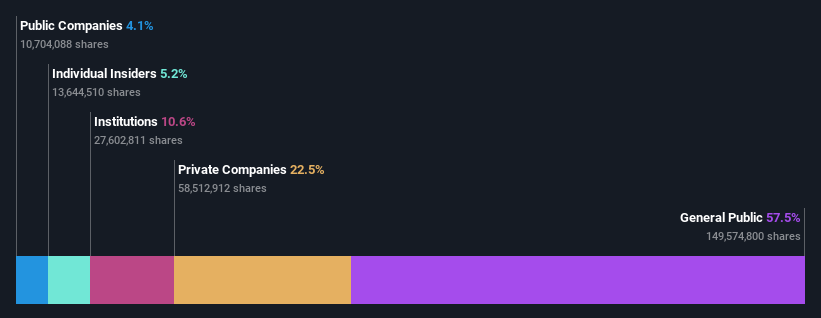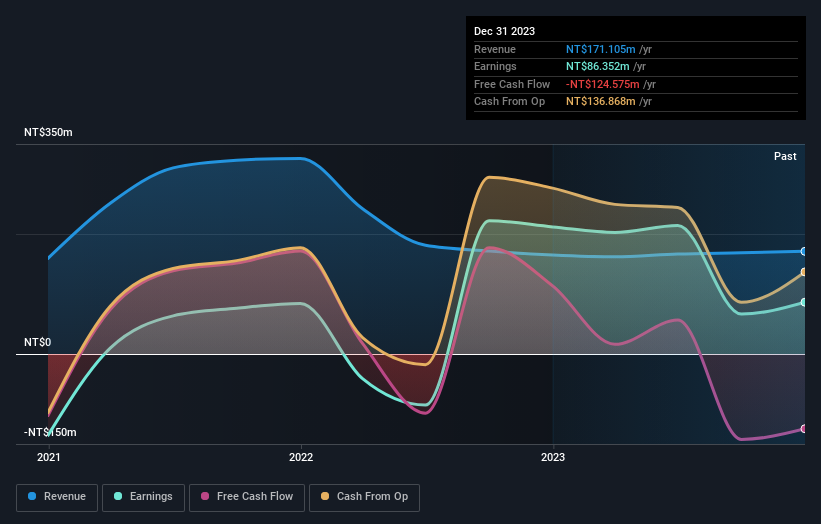- Taiwan
- /
- Paper and Forestry Products
- /
- TWSE:1903
Shihlin Paper Corporation's (TWSE:1903) market cap surged NT$1.8b last week, retail investors who have a lot riding on the company were rewarded

Key Insights
- Significant control over Shihlin Paper by retail investors implies that the general public has more power to influence management and governance-related decisions
- A total of 21 investors have a majority stake in the company with 42% ownership
- Institutional ownership in Shihlin Paper is 11%
To get a sense of who is truly in control of Shihlin Paper Corporation (TWSE:1903), it is important to understand the ownership structure of the business. We can see that retail investors own the lion's share in the company with 58% ownership. That is, the group stands to benefit the most if the stock rises (or lose the most if there is a downturn).
As a result, retail investors were the biggest beneficiaries of last week’s 12% gain.
In the chart below, we zoom in on the different ownership groups of Shihlin Paper.
Check out our latest analysis for Shihlin Paper

What Does The Institutional Ownership Tell Us About Shihlin Paper?
Institutional investors commonly compare their own returns to the returns of a commonly followed index. So they generally do consider buying larger companies that are included in the relevant benchmark index.
Shihlin Paper already has institutions on the share registry. Indeed, they own a respectable stake in the company. This can indicate that the company has a certain degree of credibility in the investment community. However, it is best to be wary of relying on the supposed validation that comes with institutional investors. They too, get it wrong sometimes. It is not uncommon to see a big share price drop if two large institutional investors try to sell out of a stock at the same time. So it is worth checking the past earnings trajectory of Shihlin Paper, (below). Of course, keep in mind that there are other factors to consider, too.

Shihlin Paper is not owned by hedge funds. Our data shows that Wan Hai Charity Foundation, Endowment Arm is the largest shareholder with 7.0% of shares outstanding. With 6.9% and 6.4% of the shares outstanding respectively, Tai Chuan Investment Co., Ltd. and Yeong Yi(Asia) Co., Ltd. are the second and third largest shareholders.
On studying our ownership data, we found that 21 of the top shareholders collectively own less than 50% of the share register, implying that no single individual has a majority interest.
While studying institutional ownership for a company can add value to your research, it is also a good practice to research analyst recommendations to get a deeper understand of a stock's expected performance. We're not picking up on any analyst coverage of the stock at the moment, so the company is unlikely to be widely held.
Insider Ownership Of Shihlin Paper
The definition of company insiders can be subjective and does vary between jurisdictions. Our data reflects individual insiders, capturing board members at the very least. Management ultimately answers to the board. However, it is not uncommon for managers to be executive board members, especially if they are a founder or the CEO.
I generally consider insider ownership to be a good thing. However, on some occasions it makes it more difficult for other shareholders to hold the board accountable for decisions.
We can see that insiders own shares in Shihlin Paper Corporation. It has a market capitalization of just NT$18b, and insiders have NT$924m worth of shares, in their own names. Some would say this shows alignment of interests between shareholders and the board. But it might be worth checking if those insiders have been selling.
General Public Ownership
The general public -- including retail investors -- own 58% of Shihlin Paper. This size of ownership gives investors from the general public some collective power. They can and probably do influence decisions on executive compensation, dividend policies and proposed business acquisitions.
Private Company Ownership
It seems that Private Companies own 23%, of the Shihlin Paper stock. It's hard to draw any conclusions from this fact alone, so its worth looking into who owns those private companies. Sometimes insiders or other related parties have an interest in shares in a public company through a separate private company.
Public Company Ownership
Public companies currently own 4.1% of Shihlin Paper stock. We can't be certain but it is quite possible this is a strategic stake. The businesses may be similar, or work together.
Next Steps:
It's always worth thinking about the different groups who own shares in a company. But to understand Shihlin Paper better, we need to consider many other factors. To that end, you should be aware of the 1 warning sign we've spotted with Shihlin Paper .
Of course this may not be the best stock to buy. Therefore, you may wish to see our free collection of interesting prospects boasting favorable financials.
NB: Figures in this article are calculated using data from the last twelve months, which refer to the 12-month period ending on the last date of the month the financial statement is dated. This may not be consistent with full year annual report figures.
New: Manage All Your Stock Portfolios in One Place
We've created the ultimate portfolio companion for stock investors, and it's free.
• Connect an unlimited number of Portfolios and see your total in one currency
• Be alerted to new Warning Signs or Risks via email or mobile
• Track the Fair Value of your stocks
Have feedback on this article? Concerned about the content? Get in touch with us directly. Alternatively, email editorial-team (at) simplywallst.com.
This article by Simply Wall St is general in nature. We provide commentary based on historical data and analyst forecasts only using an unbiased methodology and our articles are not intended to be financial advice. It does not constitute a recommendation to buy or sell any stock, and does not take account of your objectives, or your financial situation. We aim to bring you long-term focused analysis driven by fundamental data. Note that our analysis may not factor in the latest price-sensitive company announcements or qualitative material. Simply Wall St has no position in any stocks mentioned.
About TWSE:1903
Adequate balance sheet with questionable track record.


